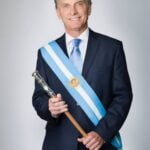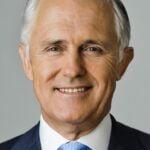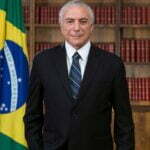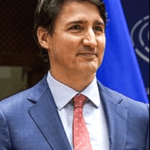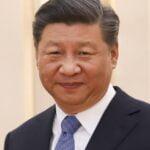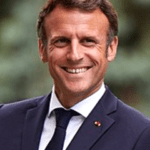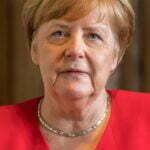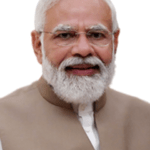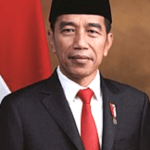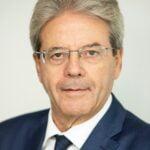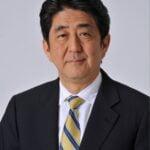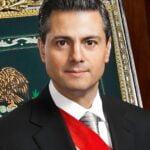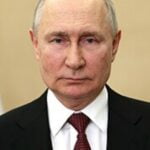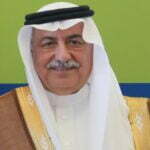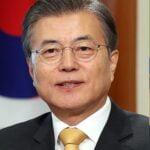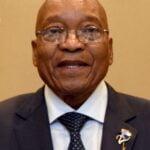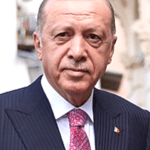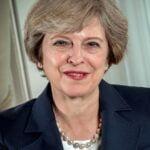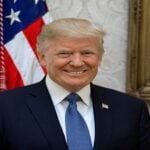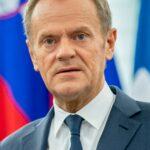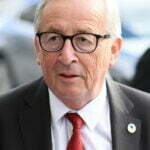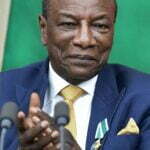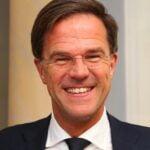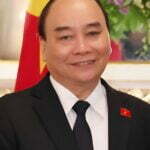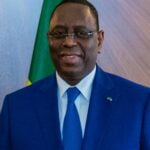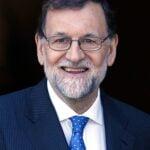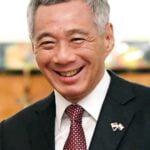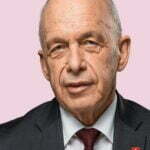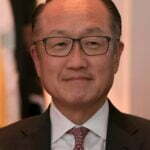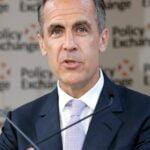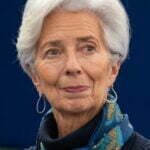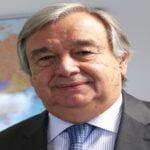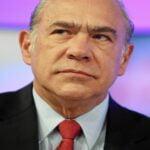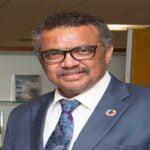2017 G20 Hamburg summit
On July 7 and 8, 2017, the 2017 G20 Hamburg summit took place at Hamburg Messe in the city of Hamburg, Germany. It was the twelfth meeting of the Group of Twenty (G20).
| 2017 G20 Hamburg summit | |
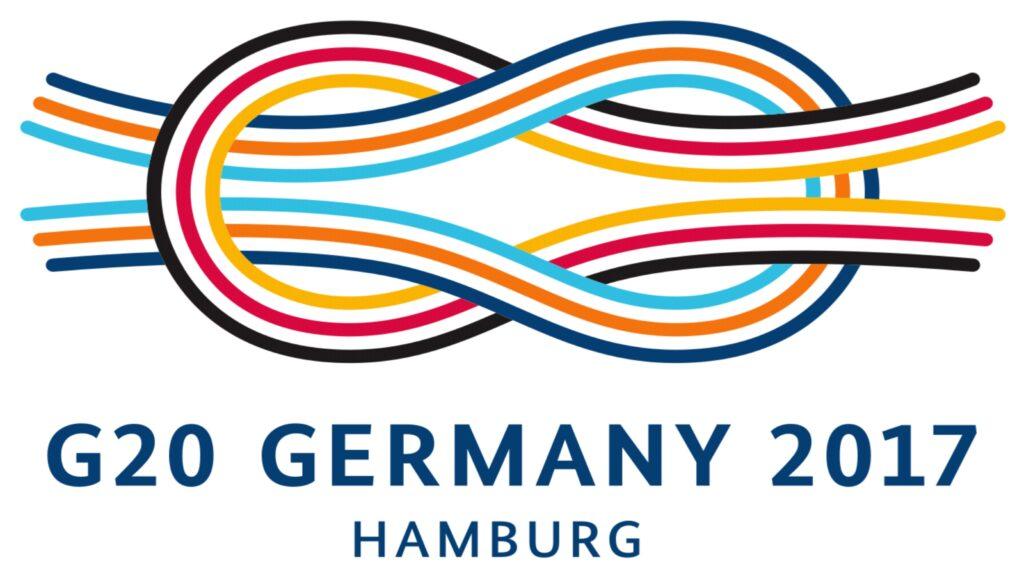 | |
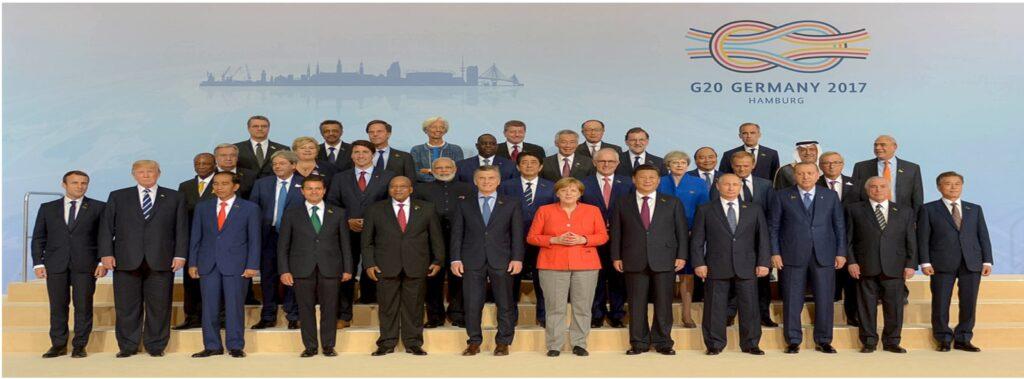 | |
| Host country | Germany |
| Date | 8 July 2017 |
| Motto | Shaping an Interconnected World |
| Venue(s) | Hamburg Messe |
| Cities | Hamburg, Germany |
| Participants | G20 members Guest invitees:
|
| Follows | 2016 G20 Hangzhou summit |
| Precedes | 2018 G20 Buenos Aires summit |
Agenda
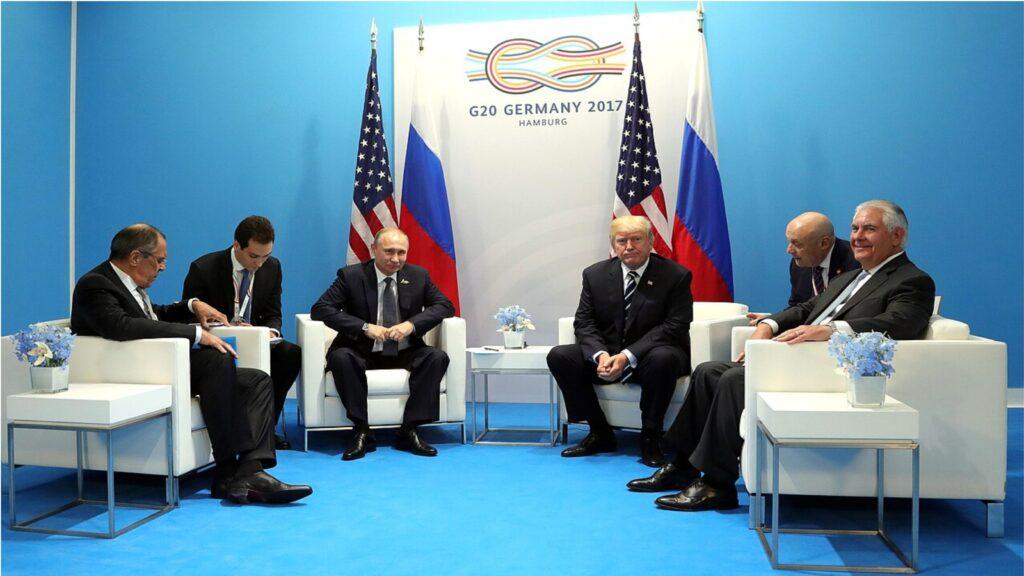
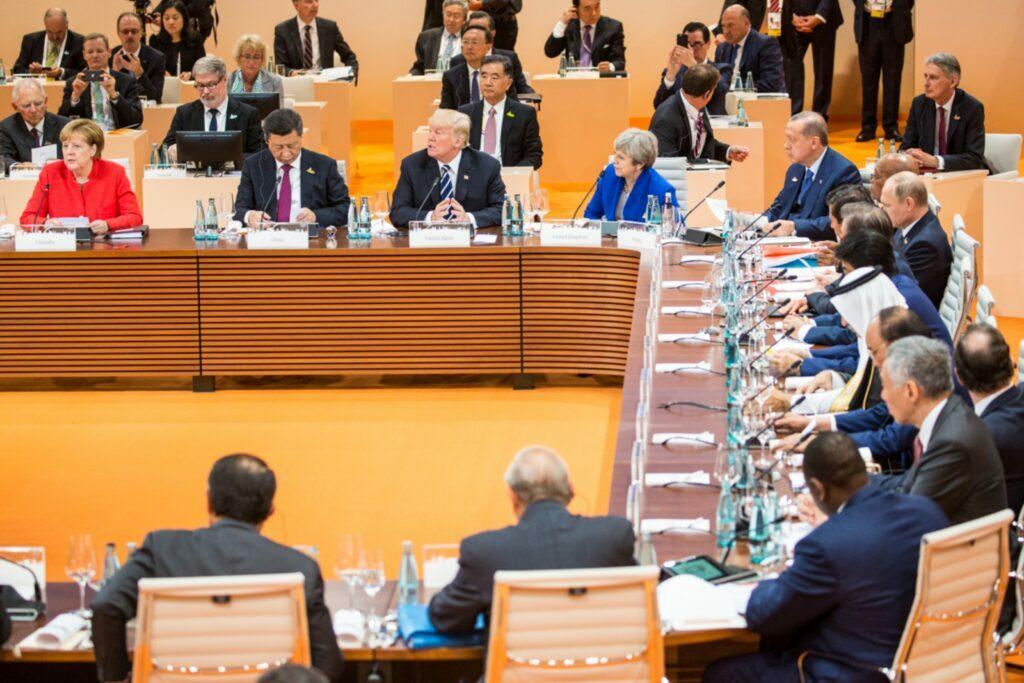
There were a number of “issues of global significance” that were expected to be discussed at the G20 summit in Hamburg, in addition to the usual topics of global economic growth, international trade, and financial market regulation.
On July 7th, the topics of terrorism, free trade, and the United States’ withdrawal from the Paris Agreement were scheduled to be discussed, while on July 8th, Africa was to be the focus.
Results
In several places, the 30-page summary document failed to provide sufficient detail. Success was defined as 20 people communicating effectively. The resolutions do not have any binding legal effect. Public attention was not paid to the signing of numerous such documents. (Addendum to Related PDF File)
German Federal Minister of Finance Wolfgang Schäuble emphasized the need for G20 countries to reach effective, cross-cutting policy measures, saying, “Globalization has lifted hundreds of millions out of poverty, but there is also a growing rise in frustration in some quarters […] development, [national] security, and migration are all interlinked. ”
Trade
The disagreements about trade and steel output stayed the same. Europe and China’s steelmakers were accused of dumping by Donald Trump, who then promised to put antidumping duties on them. The G20 wanted a report on overcapacity by November 2017.
Sustainable development
The United States and other countries did not agree on how to protect the climate. Instead, different groups had different ideas about how to use green energy. It was agreed by the other 19 parties that they would follow through on the Paris deal and quickly put it into action. It was after the summit that Erdoğan, the president of Turkey, said that his country would not sign the Paris agreement because Turkey was not an industrialized country like its neighbors but a developing country, and that Francois Hollande, who was president at the time, had promised money from other countries to help. Next, President Macron has asked members to come to Paris on December 12 for another climate meeting to continue talks. Despite opposition from the US, Germany wanted to make the most of the “renewed public policy interest in environmental sustainability, gender equality, and social inclusiveness, in the spirit of the UN’s Sustainable Development Goals (SDGs)”. They planned to do this by encouraging all countries to use more renewable energy and stop using fossil fuels.
More inclusive growth
The G20 final declaration highlighted the importance of trade agreements being both reciprocal and non-discriminatory toward poor nations. This is a shift from the previous focus on prioritizing liberalization and the promotion of free market economics universally.
Indian-Norwegian cooperation
During a meeting between India’s Prime Minister Narendra Modi and Norway’s Prime Minister Erna Solberg, Modi extended an invitation to Norwegian pension funds to invest in India’s National Infrastructure Investment platform. In a symbolic gesture of renewed cooperation towards achieving the Sustainable Development Goals (SDGs), Solberg presented Modi with a round leather football embroidered with the initials ‘SDGs’.
Women’s Economic Empowerment
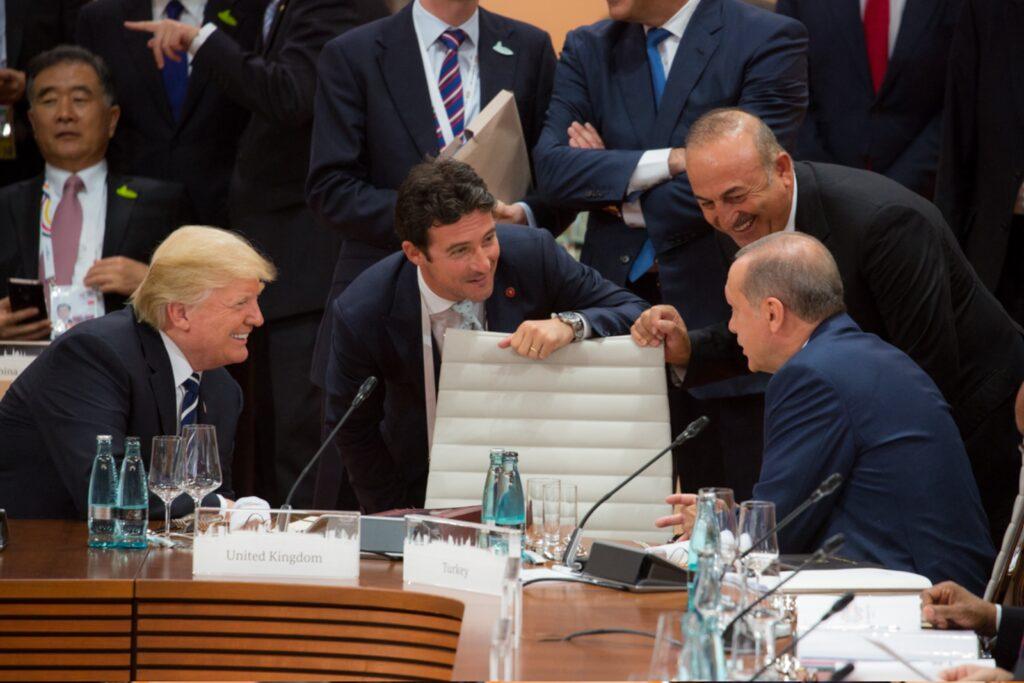
The White House, through First Daughter Ivanka Trump, and the World Bank Group have announced the launch of a new fund that will provide capital, finance, and management assistance to women business owners in developing countries. President of the World Bank Group Jim Yong Kim stated his hope to leverage the $325 million already pledged by various governments into a multi-billion-dollar investment framework for the Women Entrepreneurs Finance Initiative fund. With the words, “by investing in women around the world, we’re investing in families, we’re investing in prosperity, and we’re investing in peace,” President Trump pledged $50 million from the United States to kickstart the fund.
After being approached by Jim Yong Kim, Moroccan businesswoman Miriem Bensalah-Chaqroun agreed to participate in the initiative’s launch.
Refugee crisis and migration
Officially, international migration didn’t become a G20 issue until 2015, when the “ongoing refugee crisis” was named a global issue in the final leaders’ statement from the Antalya Summit. Finally, in September 2016, at the Hangzhou Summit, almost a year later, G20 leaders made their call for more burden sharing, humanitarian aid, and development funds. Their agreement also included “addressing forced displacement in 2017 with a view to developing concrete actions” and looking into problems related to migration. Nevertheless, the Hamburg Declaration from July 2017 talks about migration and forced displacement in a general way, but it doesn’t suggest any “concrete actions” in either area.
Counter-terrorism and national security
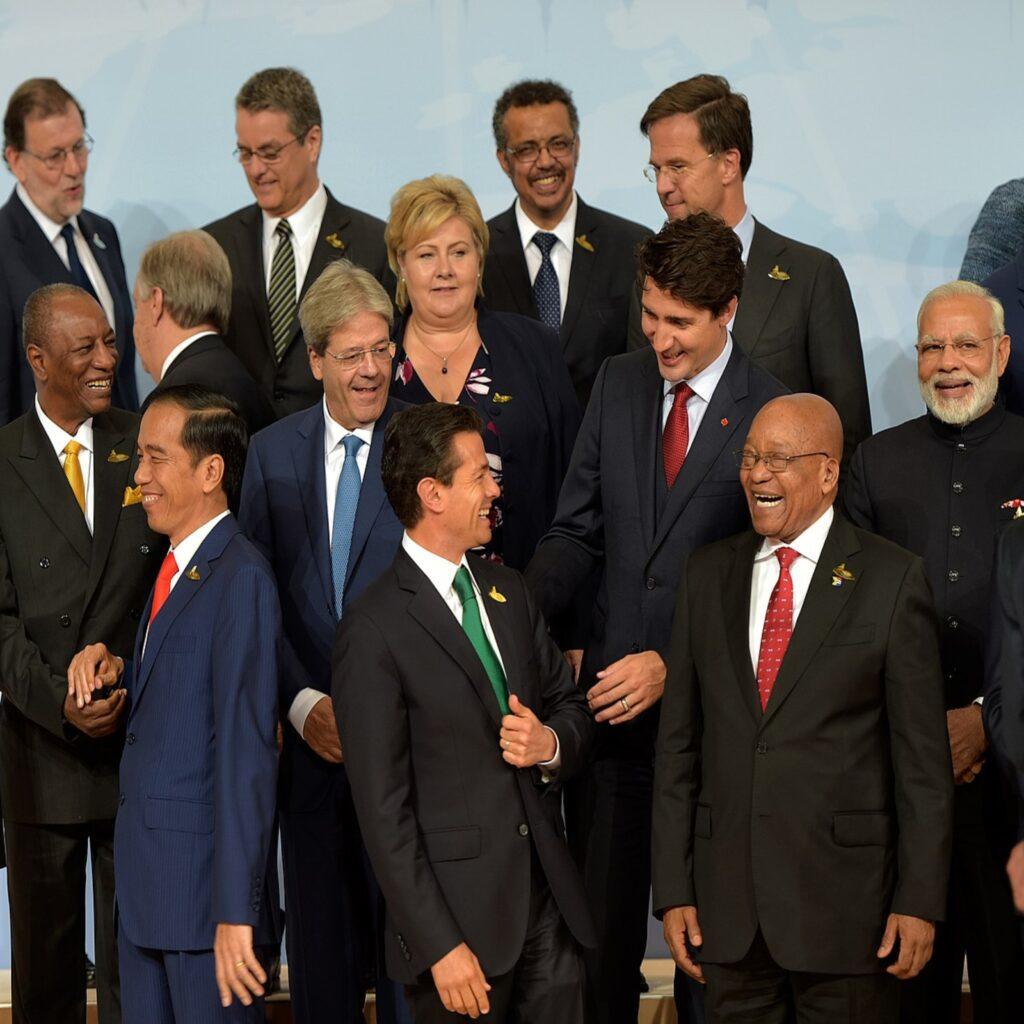
They all decided to keep an eye on the financial markets and fight money laundering and tax evasion. People who took part in the meeting strongly agreed to keep markets open and fight nationalism and unfair trade practices. The USA took a strong stance because Trump backs protectionism. The people who were there decided to work together with African countries and passed a special document outlining their plans. Leaders of the G20 promised in a statement that they would do what they could to stop people from using the internet to spread lies. Modi essentially went after Pakistan, which is not a G20 member, by naming terrorist groups that operate from Pakistan and saying that all of them have the same goal: to spread hate and kill people. In his speech, Indonesian President Joko Widodo called on all member states to work together to fight terrorism. He also stressed the importance of both prevention and de-radicalization programs.
Both of them “discussed forming an impenetrable cybersecurity unit so that election hacking and many other negative things would be guarded and safe.” After the fact, Trump said he doesn’t think this will happen.
Trump and Putin made a deal to temporarily stop fighting in southwest Syria. Beginning on July 10, 2012, at 12 a.m. local time, representatives from both nuclear powers will talk to each other. Angela Merkel, the chancellor of Germany, told reporters at the end of the G20 summit, “I was delighted that the first meeting between Trump and Putin took place on the margins of the G20.” Talking to each other is always better than talking about each other. I liked hearing that they talked for a long time. It was where they met for the first time in real life.
Participating leaders
Participants in the G20 conference in Hamburg in 2017 are as follows:
|
|
|
|
|
|
|
|
| |
|
|
|
|
|
|
|
|
|
|
|
|
Guest invitees
|
|
|
|
|
|
|
|
Brazil incertitude
When Brazilian President Michel Temer was facing corruption charges from General Prosecutor Rodrigo Janot, who accused him of receiving bribes from meat company JBS S.A., he abruptly canceled a trip to Hamburg that he had planned to attend without providing an explanation. On July 4th, Temer changed his mind.
Saudi Arabian delegation
King Salman has decided to withdraw his intention to attend the summit and has instead appointed State Minister Ibrahim Abdulaziz Al-Assaf to lead the Kingdom’s delegation in his place. A formal explanation was not given.
International organizations
|
|
|
|
| |
|
|
|
|
Security
From July 5 to 8, security zones were established with restricted entry and a notably increased number of Hamburg police officers, who were supported by officers from other police forces. As protests unfolded, further reinforcements from various parts of the country were dispatched. There were a total of forty-five water cannons at hand, and restricted airspace was enforced over some areas of the city.
Protests and riots
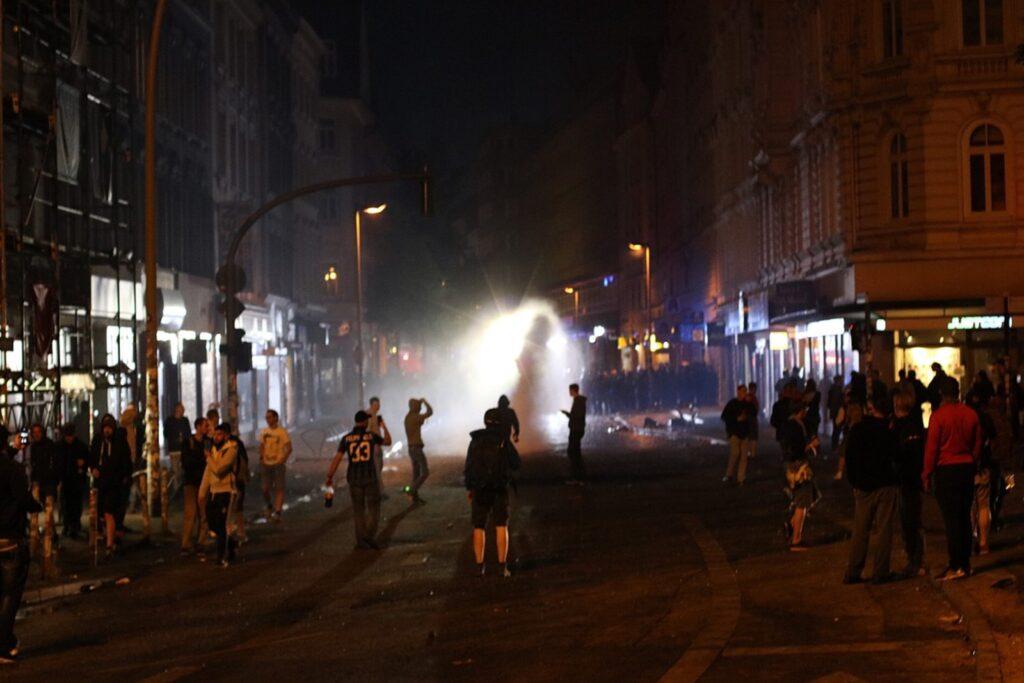
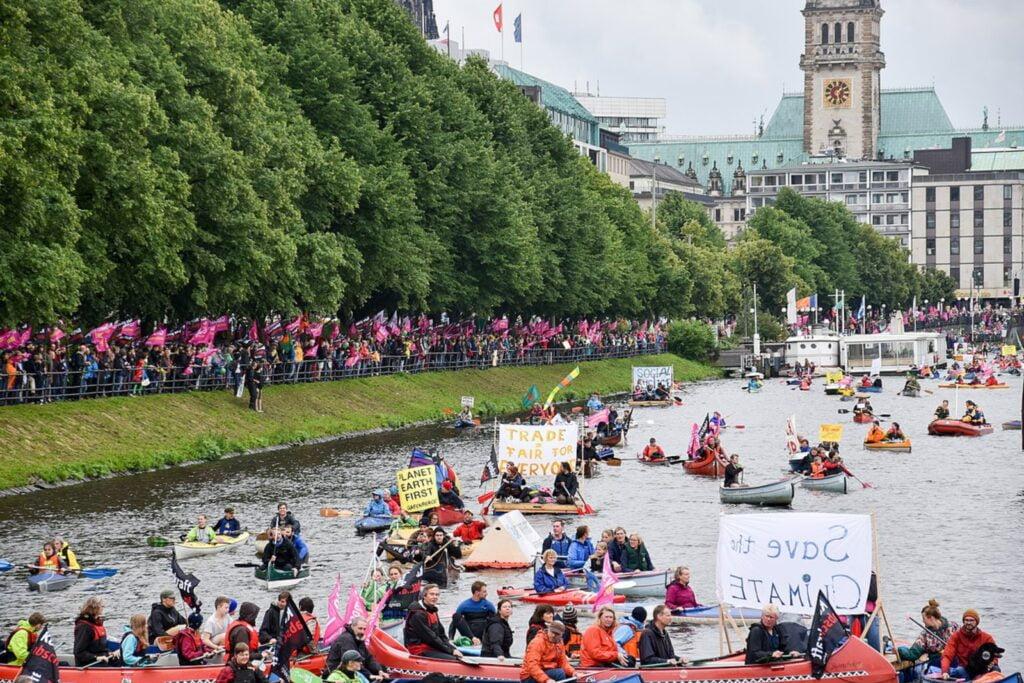
The G20 conference was the primary target of German extreme-left propaganda in 2017. A total of 320 police officers sustained injuries during the clashes. Interior Minister Horst Seehofer specifically denounced the dissemination of photographs of police officers on duty during the summit within far-left networks. Out of the total of 1135 instances of violent acts committed by far-left groups in Germany during that year, 832 took place specifically during the summit.
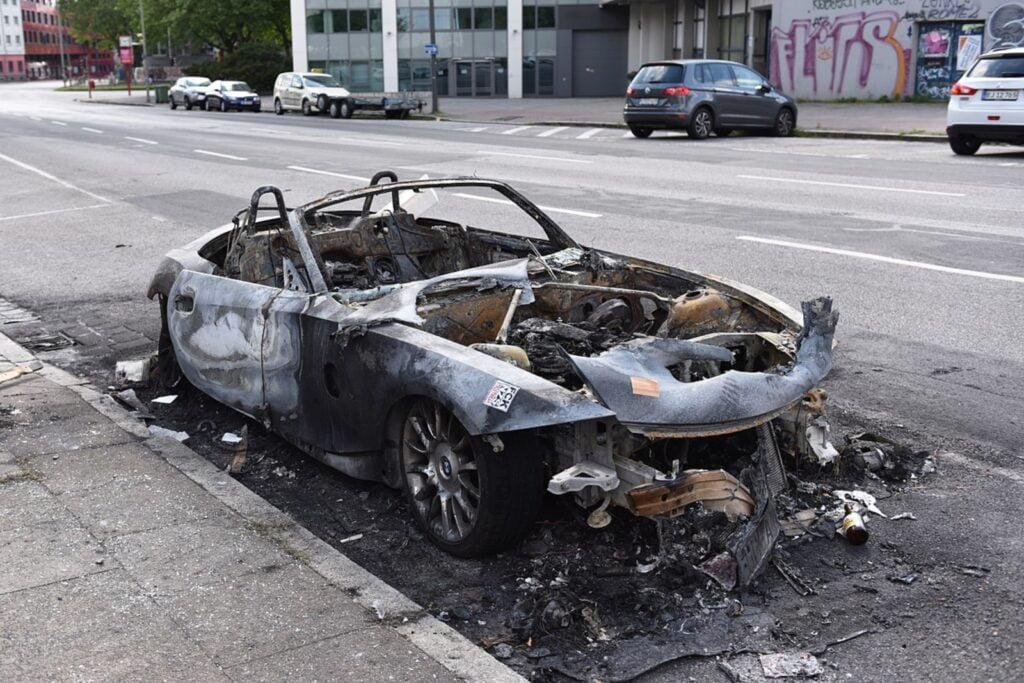
For a few weeks before the meeting, there were random car fires in the city in outlying areas, like the Blankenese neighborhood. On the night of June 18, 2017, 13 fire attacks on German train tracks were carried out by unknown people in Berlin, Hamburg, Cologne, Dortmund, Leipzig, and Bad Bevensen. The German news agency DPA reported a security expert as saying that there was “a possibility” of a link between the upcoming G20 Summit and left-wing extremism. A spokesman for the German interior ministry said that “unconventional explosive and incendiary devices” were to blame for the wire fires. Even though it was very hot (30 °C or 86 °F) on June 18, cops didn’t think the fires were caused by the heat.
In a post on the internet on June 19, a group called “Shutdown G20: Hamburg vom Netz nehmen!” said they were behind the attacks.
A Greenpeace group caused a bulk freighter carrying charcoal from Murmansk that was coming into the city on July 2 to stop. After the cops stepped in, the boat was able to pass through.
It was planned that there would be more than 25 different types of protests and marches in Hamburg during G20 week. One of them was an alternative Global Solidarity Summit from July 5th to 6th, and on July 5th, between 11,000 and 20,000 people came to the calm dance-protest-march called Lieber Tanz ich als G20.
One group of performance artists, 1000 Gestalten, painted their bodies gray and walked slowly through the streets like zombies. This show was put on to bring attention to people who don’t care about politics. After going for a walk, they all took off their gray clothes. There were bright clothes underneath, which meant getting involved and awake.
On July 6, protests went violent. More than 75 people were arrested, and more than 160 police officers were hurt in fights with protesters. Protesters tried to break into the “red zone” where the meeting was held, but water cannons were used to push them back. Some protesters said they wanted to stop the attendees’ way to the summit site. Because of the protests, US First Lady Melania Trump couldn’t go on a harbor cruise.
People who were angry on July 7 set fire to dozens of parked cars. [59] Several stores were broken into and stolen from during the riots in the Schanzenviertel area on July 7. For three hours, masked rioters and radicals from the “black bloc” could not be stopped. To stop the violence, special armed police forces were sent in.
About 76,000 people joined the “Solidarity without Borders” march on July 8, which was the biggest peaceful protest ever. It was put together by 174 groups and organizations working together.
Even though the G20 leaders had already left by early Sunday morning, July 9, riots continued in the Schanzenviertel, and 144 people were arrested.
Over 15,000 police officers from all over the country were sent to the event, which had 100,000 protests.
People in the area thought that the government made a mistake by putting the meeting in an area with a lot of people. There were 186 people taken in total. There were 132 Germans, 8 French, 7 Italians, 5 Swiss, and people from Russia and Spain. There were 225 more people temporarily taken into prison.
Based on what the German police looked into, the far-left protesters were responsible for more than 2,000 crimes, such as vandalism (575 cases), physical harm (330 cases), disturbing the peace (303 cases), arson (123), and resisting arrest (45 cases).
Activists and the media criticized how the police responded to the protests, saying they were violent and meant to make the situation worse.
The riots made the Hamburg Senate talk about violence from leftist radicals and how to stop it from happening again. Researchers came to the conclusion that methods that worked to stop right-wing and Islamist militants from being violent could not be used again to stop left-wing militants.
Investigations and trials
There were 3,580 cases being handled by police in January of 2020, despite the fact that thousands of cases were already in progress. There were 135 people the police were looking for. Also, out of 156 police-related complaints, 109 were found to be unfounded. Members of the Hamburg council’s left wing have expressed frustration that legal action against police has yet to commence.
After an 18-month trial, five individuals, four from the German state of Hesse and one from France, were found guilty of riot charges in July 2020. The French national was found guilty of instigating arson, assaulting police, and causing bodily harm and was given a three-year prison sentence. Probation or community service was given to the four German defendants. The prosecutor had requested life sentences for all five defendants on the basis of their arson convictions.
A court in 2022 determined that the reaction of the German police was improper.
Members of the Saxony state police used excessive force, according to a parliamentary probe chaired by Alliance 90/The Greens MP Valentin Lippman. More specifically, it was discovered that roughly 15 rubber bullets were fired from HK69A1 grenade launchers at protestors, despite it being illegal to do so in Germany.
Incidents
Liu Xiaobo, China’s most famous political prisoner, is a democracy fighter and Nobel laureate. He was granted medical parole on the night of the G20 conference in Hamburg after being diagnosed with terminal liver cancer.
During the “digital security and information management workshop” that took place in Istanbul, Turkey, on the day of the G20 summit in Hamburg in July 2017, the country arrested a total of 12 people. Among them was Dil Eser, who serves as the director of Amnesty International in Turkey. Among the activists who were taken into custody were Lknur Üstun, an organizer with the Women’s Coalition; Gunal Kurun, a lawyer; and Veli Acu, an organizer with the Human Rights Agenda Association.
Related Topics:
